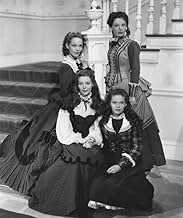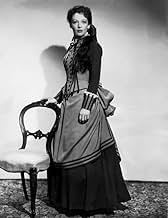Liebe und Leben des Telefonbauers A. Bell
Originaltitel: The Story of Alexander Graham Bell
IMDb-BEWERTUNG
7,0/10
1237
IHRE BEWERTUNG
Füge eine Handlung in deiner Sprache hinzuThe story of how Alexander Graham Bell invented the telephone.The story of how Alexander Graham Bell invented the telephone.The story of how Alexander Graham Bell invented the telephone.
- Auszeichnungen
- 3 wins total
Empfohlene Bewertungen
If are looking for an accurate and detailed lesson about either the life of Alexander Graham Bell or the invention of the telephone, this film is far from perfect. Often it takes liberties and omissions--all in the aim of producing an entertaining film first and foremost. However, if you understand that it is NOT great history but purely there to entertain, it's pretty good. I would not put in on par with the Edison films at MGM or the wonderful Warner Brothers films on Pasteur and Erlich, but it is quite good.
The movie only concerns the period just before the telephone was invented as well as the process of inventing and marketing the device. So, if you want information about his work as a deaf educator or about his interesting family background, this film is maddeningly silent. I would LOVE to see a film talk particularly talking about his hatred of sign language (as he felt the deaf MUST be forced to learn to talk and function like the hearing) or the disdain many deaf today have for him. Perhaps this sort of discussion would be best dealt with in a documentary, but it IS fascinating stuff.
As far as this film goes, Ameche, Fonda and Young are all very good here, the direction very nice and the entire production is polished and pleasant from start to finish.
The movie only concerns the period just before the telephone was invented as well as the process of inventing and marketing the device. So, if you want information about his work as a deaf educator or about his interesting family background, this film is maddeningly silent. I would LOVE to see a film talk particularly talking about his hatred of sign language (as he felt the deaf MUST be forced to learn to talk and function like the hearing) or the disdain many deaf today have for him. Perhaps this sort of discussion would be best dealt with in a documentary, but it IS fascinating stuff.
As far as this film goes, Ameche, Fonda and Young are all very good here, the direction very nice and the entire production is polished and pleasant from start to finish.
Irving Cummings does an excellent job directing the cast of assembled actors in this film. The story itself is taken from the memories of the daughter of Alex Bell and follows through with all the trials and tribulations of Bell himself. Beginning with the decision he gave up teaching the deaf and dumb to speak and through the obscure and menial existence of an inventor, up through the difficult task fighting for his invention in court. Don Ameche plays Alexander Graham Bell, who does so with such spirit and vitality, audiences will later realize why this actor is so synonymous with the character. The same is true with Henry Fonda who plays Thomas Watson who also is easily identified with this movie. Loretta Young, Charles Coburn and Gene Lockhart are magnificent and help insure this black and white becomes a solid standard in any collection of what we now understand as Classic films. ****
Story of Alexander Graham Bell, The (1939)
*** (out of 4)
Delightful tale of Alexander Graham Bell (Don Ameche) who while attempting to create the telephone falls in love with a mute girl (Loretta Young). The film really doesn't go into much detail about how the phone was created but instead it focuses on the pain that Bell went through while trying to break through. Ameche is downright brilliant in every shape of the word and his strong performance makes you forget several of the flaws throughout the film. Loretta Young is also very good as his wife and Henry Fonda adds nice support as the assistant. The film has some nice humor to go along with the drama and while I'm sure there are some facts made up, the film is still worth watching if you're a fan of the cast.
*** (out of 4)
Delightful tale of Alexander Graham Bell (Don Ameche) who while attempting to create the telephone falls in love with a mute girl (Loretta Young). The film really doesn't go into much detail about how the phone was created but instead it focuses on the pain that Bell went through while trying to break through. Ameche is downright brilliant in every shape of the word and his strong performance makes you forget several of the flaws throughout the film. Loretta Young is also very good as his wife and Henry Fonda adds nice support as the assistant. The film has some nice humor to go along with the drama and while I'm sure there are some facts made up, the film is still worth watching if you're a fan of the cast.
Movies about history are very important. They also need to be entertaining and believable. All three of those qualities need to be involved in a film such as this. Don Ameche brings to the silver screen an early representation of the life of Alexander Graham Bell and his contribution to the world. The invention of the telegraph and the telephone are explored in this Irving Cummings film.
I bet you didn't know that AGB got his inspiration for the telephone from his years of teaching the deaf talk and communicate. That brings us to the love interest portion of the film, when we are introduced to the future Mrs. Mable Bell, who also is deaf, played by Loretta Young. It is a very interesting contrast between the film's intention and what the facts entail, because the first full decade of the talkies and sound happened in the 1930s, which makes that the quietest decade in film history, as it applies to full sound in film. It is interesting that there is no music in the movie, hardly at all, because this is a movie about trying to achieve the ability to hear and to transmit sound, so this is, kind of, an interesting juxtaposition of how this movie feels.
It also is interesting seeing a film that was made only 65 years after Bell did his experiments, so you get a more uniquely believable script, then if it was one produced today, because 150 years have now gone by since Bell did his experiments. It also is apparent that the mind of an inventor can also be driven by his love of people or his compassion towards the world he/she lives in. None of that is more apparent when we see the love that is shared between Bell and his deaf students and his eventual love to Mable.
Ameche is also contrasted with his less intelligent assistant Thomas Watson, played by Henry Fonda, who compensates for his lack of certain knowledge by being Bell's friend and cheerleader. This film teaches us that drive and desire doesn't always have to lead to power and money, but can sometimes lead to what it really should, love and accomplishment.
8.1 (B MyGrade) = 8 IMDB.
I bet you didn't know that AGB got his inspiration for the telephone from his years of teaching the deaf talk and communicate. That brings us to the love interest portion of the film, when we are introduced to the future Mrs. Mable Bell, who also is deaf, played by Loretta Young. It is a very interesting contrast between the film's intention and what the facts entail, because the first full decade of the talkies and sound happened in the 1930s, which makes that the quietest decade in film history, as it applies to full sound in film. It is interesting that there is no music in the movie, hardly at all, because this is a movie about trying to achieve the ability to hear and to transmit sound, so this is, kind of, an interesting juxtaposition of how this movie feels.
It also is interesting seeing a film that was made only 65 years after Bell did his experiments, so you get a more uniquely believable script, then if it was one produced today, because 150 years have now gone by since Bell did his experiments. It also is apparent that the mind of an inventor can also be driven by his love of people or his compassion towards the world he/she lives in. None of that is more apparent when we see the love that is shared between Bell and his deaf students and his eventual love to Mable.
Ameche is also contrasted with his less intelligent assistant Thomas Watson, played by Henry Fonda, who compensates for his lack of certain knowledge by being Bell's friend and cheerleader. This film teaches us that drive and desire doesn't always have to lead to power and money, but can sometimes lead to what it really should, love and accomplishment.
8.1 (B MyGrade) = 8 IMDB.
I always thought of him being an under rated actor. He certainly was versatile. He could sing, play comedy and drama, and if for no other reason, the academy finally realized his talents and gave him an oscar. It was long overdue. As for this film, he was very good and keep in mind Henry Fonda was playing a supporting role. As for Loretta Young..she was very lovely during those years, but her role had me squirming. As a deaf person, she spoke very well and the audience knows she's deaf because she makes it obvious as to her glaring at the actors mouths. I don't recall anyone mentioning if she was born deaf, or acquired it in later life.All in all, a satisfying film..thanks to Don's performance.
Wusstest du schon
- WissenswertesAfter the film was released, the telephone was commonly called the "Ameche," a slang term referring to actor Don Ameche who played the telephone's inventor. This association is explained in the film Wirbelwind der Liebe (1941), showing the term was still in use two years after the release of the original film.
- PatzerOne of the stories in the movie, that is set in 1873, is that Alexander Graham Bell invented the telephone "in his youth". But the first telephone was invented by Antonio Meucci in 1860 and Johann Philipp Reis in 1861, who also called his device "telephone", not Bell as it's stated in the movie. Bell didn't invent THE telephone but A telephone, the Bell-telephone.
- Zitate
Mrs. Hubbard: Mr. Watson, please eat something. You must have the appetite of a bird.
Thomas Watson: Yes, Ma'am, a vulture.
- VerbindungenFeatured in Salut für ...: Salut für Henry Fonda (1978)
- SoundtracksThe First Noel
Traditional 17th century hymn
Sung a cappella by unidentified carollers on Christmas Eve
Top-Auswahl
Melde dich zum Bewerten an und greife auf die Watchlist für personalisierte Empfehlungen zu.
- How long is The Story of Alexander Graham Bell?Powered by Alexa
Details
- Erscheinungsdatum
- Herkunftsland
- Sprache
- Auch bekannt als
- The Story of Alexander Graham Bell
- Drehorte
- Produktionsfirmen
- Weitere beteiligte Unternehmen bei IMDbPro anzeigen
Box Office
- Budget
- 1.500.000 $ (geschätzt)
- Laufzeit1 Stunde 38 Minuten
- Farbe
- Seitenverhältnis
- 1.37 : 1
Zu dieser Seite beitragen
Bearbeitung vorschlagen oder fehlenden Inhalt hinzufügen

Oberste Lücke
By what name was Liebe und Leben des Telefonbauers A. Bell (1939) officially released in Canada in English?
Antwort





































